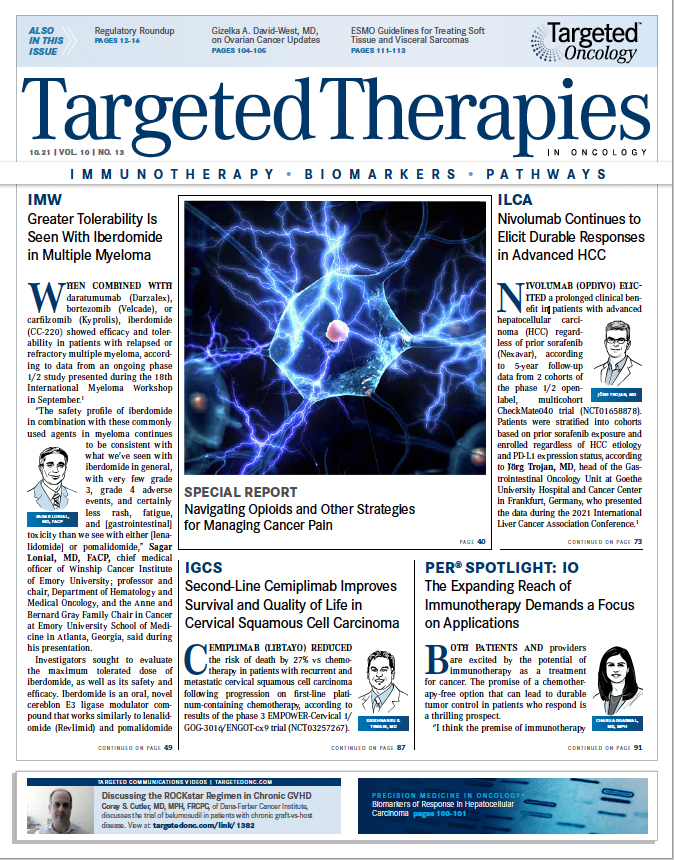Understanding irAEs Is Vital for IO Combo Use in HCC
In an interview with during the 2021 International Liver Cancer Association Annual Conference, David J. Pinato, MD discussed combination strategies in hepatocellular carcinoma, how to manage associated toxicities, and how safety profiles can help to inform treatment decisions for this patient population.
David J. Pinato, MD

Understanding the potential for and management of immune-related toxicities associated with immune checkpoint inhibition use is a crucial factor in determining whether a combination regimen is the best strategy for an individual patient with hepatocellular carcinoma (HCC), according to David J. Pinato, MD.
“In HCC, we are not guided by the presence of strong molecular biomarkers thatvwill enable the understanding of the patients that will respond better to PD-1 monotherapy [or in combination]. Therefore, it becomes crucial to think about toxicity as one of the determining factors [for treatment], that could then lead to an informed discussion with the patient [on their] preference,” said Pinato, a clinician scientist and consultant medical oncologist in the Department of Surgery and Cancer at the Imperial College of Medicine in London, United Kingdom.
In an interview with Targeted Therapies in Oncology™ (TTO) during the 2021 International Liver Cancer Association (ILCA) Annual Conference, Pinato discussed combination strategies in HCC, how to manage associated toxicities, and how safety profiles can help to inform treatment decisions for this patient population.
TTO: What are the main differences in managing the toxicities for an immunotherapy plus VEGF TKI and dual immunotherapy combinations?
PINATO: In HCC, there are now several different therapies approved. For the PD-1 inhibitors, the types of toxicities that are encountered are immune-mediated. The proportion of patients who experience severe adverse events [AEs] varies based on whether PD-1 monotherapy is used compared with, PD-1 plus CTLA-4 inhibitor combinations, where there is evidence of synergistic toxicity. This principle [has been proven] across many different malignancies, and it stands true in HCC, as well. The most recent trials of ipilimumab [Yervoy] and nivolumab [Opdivo] compared with pembrolizumab [Keytruda] and nivolumab as monotherapy have shown that the proportion of severe AEs gets multiplied. However, the types of AEs are still immune-mediated.
On the other hand, combinations with TKIs come with additive toxicity. Each individual drug exerts their own on-target or off-target mechanisms of toxicity and as such, it is important to recognize this in clinical management. [We must] be careful about causality of association between drug and toxicity so that we can decide whether the patient should carry on with monotherapy, whether the TKI should be reduced, or whether the overall regimen should be changed and delayed.
What AEs should providers be aware of and how should they best be managed?
For double checkpoint inhibitor [regimens], as well as monotherapy, liver dysfunction is of paramount importance. This patient population [often] has underlying cirrhosis, and therefore needs to be monitored closely, especially for liver function test changes, or changes in alanine and aspartate aminotransferases. All patients who develop a potential AE need to go through a strict Common Toxicity Criteria– based grading because that is going to be highly informative in terms of whether immune checkpoint inhibitors can be continued safely, without any changes. [We must also] monitor for changes in the blood tests, especially for hepatotoxicity. This is often the way toxicity presents, with no symptoms, just changes in blood tests.
[However], if more toxicities are present in the same patient, such as hepatitis, colitis, or pneumonitis, inpatient admission is mandated, and high-dose corticosteroids therapy is going to potentially change the outcome for this patient. [We must] always think about what else might be causing the problem so that the situation can be managed accordingly.
[AEs with dual immunotherapy are] more challenging because any system can be affected. [I tend to mention] inflammation, as this is something that often resonates with the patient. [I always make sure to tell patients that these] drugs can trigger excess immunity against any of their own systems, therefore they should keep an eye on any unusual symptoms.
I like to underline [AEs such as] fatigue, [because this] could be due to thyroid dysfunction or pituitary dysfunction. Additionally, diarrhea is often caused by immune checkpoint inhibitors. Other things [to look for] are more evident, like skin rashes.
Are there any guidelines that you find helpful in managing toxicities?
There was a paper published in the Journal of Hepatology1 that takes into account the characteristics of patients with HCC. However, in terms of guidance for the evaluation of toxicity and management in patients with HCC, the ASCO and ESMO guidelines are excellent at providing context on how to diagnose immune pathology due to checkpoint inhibitors. [Additionally, these guidelines are helpful in terms of] ensuring that broad differentials are maintained whenever a patient turns up with a potential toxicity, so that if there is an alternative diagnosis, that is highly considered.
REFERENCE:
Sangro B, Chan SL, Meyer T, Reig M, El-Khoueiry A, Galle PR. Diagnosis and management of toxicities of immune checkpoint inhibitors in hepatocellular carcinoma. J Hepatol. 2020;72(2):320-341. doi:10.1016/j.jhep.2019.10.02

Survivorship Care Promotes Evidence-Based Approaches for Quality of Life and Beyond
March 21st 2025Frank J. Penedo, PhD, explains the challenges of survivorship care for patients with cancer and how he implements programs to support patients’ emotional, physical, and practical needs.
Read More